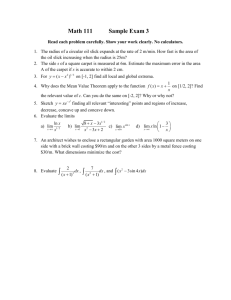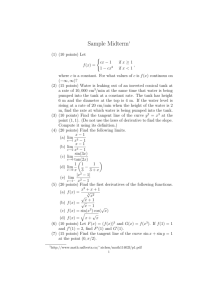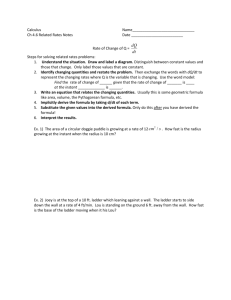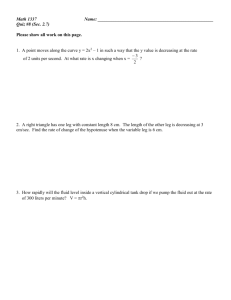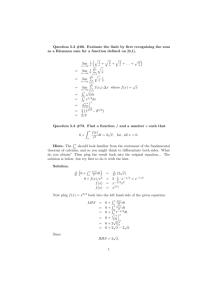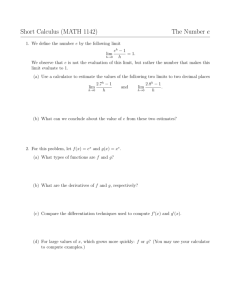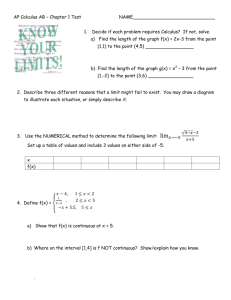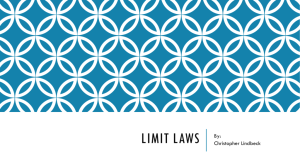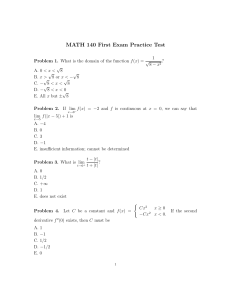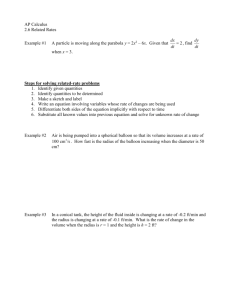Exam 2 Review Guide for MTH 141 Note: As SI leaders we do not
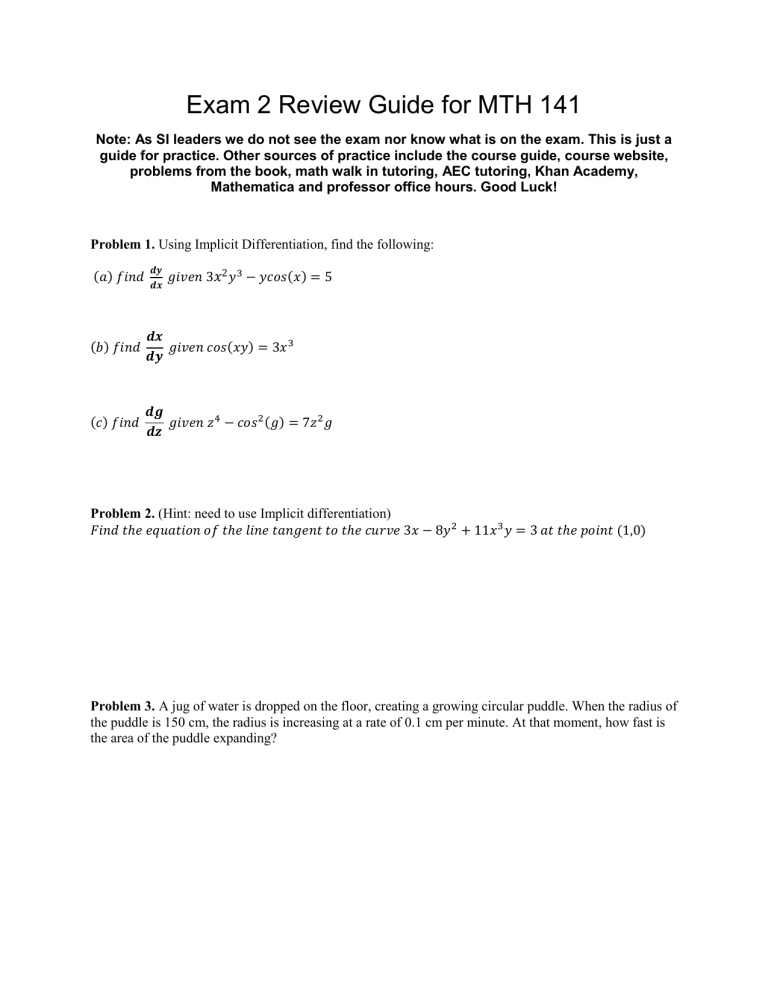
Exam 2 Review Guide for MTH 141
Note: As SI leaders we do not see the exam nor know what is on the exam. This is just a guide for practice. Other sources of practice include the course guide, course website, problems from the book, math walk in tutoring, AEC tutoring, Khan Academy,
Mathematica and professor office hours. Good Luck!
Problem 1. Using Implicit Differentiation, find the following:
(𝑎) 𝑓𝑖𝑛𝑑 𝒅𝒚 𝒅𝒙
𝑔𝑖𝑣𝑒𝑛 3
𝑥
2 𝑦
3
− 𝑦𝑐𝑜𝑠(𝑥) = 5
(𝑏) 𝑓𝑖𝑛𝑑 𝒅𝒙 𝒅𝒚
𝑔𝑖𝑣𝑒𝑛 𝑐𝑜𝑠(𝑥𝑦) = 3𝑥
3
(𝑐) 𝑓𝑖𝑛𝑑 𝒅𝒈 𝒅𝒛
𝑔𝑖𝑣𝑒𝑛 𝑧
4
− 𝑐𝑜𝑠
2 (𝑔) = 7𝑧 2 𝑔
Problem 2.
(Hint: need to use Implicit differentiation)
𝐹𝑖𝑛𝑑 𝑡ℎ𝑒 𝑒𝑞𝑢𝑎𝑡𝑖𝑜𝑛 𝑜𝑓 𝑡ℎ𝑒 𝑙𝑖𝑛𝑒 𝑡𝑎𝑛𝑔𝑒𝑛𝑡 𝑡𝑜 𝑡ℎ𝑒 𝑐𝑢𝑟𝑣𝑒 3𝑥 − 8𝑦
2
+ 11𝑥
3 𝑦 = 3 𝑎𝑡 𝑡ℎ𝑒 𝑝𝑜𝑖𝑛𝑡 (1,0)
Problem 3.
A jug of water is dropped on the floor, creating a growing circular puddle. When the radius of the puddle is 150 cm, the radius is increasing at a rate of 0.1 cm per minute. At that moment, how fast is the area of the puddle expanding?
Problem 4.
A ladder 20 feet long leans against a house. If the bottom of the ladder slides away from the house horizontally at a rate of 4 ft/sec, how fast is the ladder sliding down the house when the top of the ladder is 8 feet from the ground?
Problem 5.
A tank of water in the shape of a cone pointing downwards is leaking water at a constant rate of 2𝑓𝑡
3
/ℎ𝑜𝑢𝑟 . The base radius of the tank is 5 ft and the height of the tank is 14 ft. (Note: Volume of a
1 cone is equal to 𝑉 =
3 𝜋𝑟 2 ℎ )
(a) At what rate is the depth of the water in the tank changing when the depth of the water is 6 ft?
(b) At what rate is the radius of the top of the water in the tank changing when the depth of the water is 6 ft?
Problem 6.
𝐹𝑖𝑛𝑑 𝑡ℎ𝑒 𝑙𝑜𝑐𝑎𝑙 𝑙𝑖𝑛𝑒𝑎𝑟 𝑎𝑝𝑝𝑟𝑜𝑥𝑖𝑚𝑎𝑡𝑖𝑜𝑛 𝑜𝑓 𝑓(𝑥) = 𝑥
3
𝑎𝑡 𝑥 = 1.1 𝑏𝑦 𝑢𝑠𝑖𝑛𝑔 𝑥
0
= 1
Problem 7.
𝑈𝑠𝑒 𝑙𝑜𝑐𝑎𝑙 𝑙𝑖𝑛𝑒𝑟𝑖𝑧𝑎𝑡𝑖𝑜𝑛 𝑡𝑜 𝑎𝑝𝑝𝑟𝑜𝑥𝑖𝑚𝑎𝑡𝑒 𝑓(𝑥) = (1 + 𝑥) 15 𝑎𝑡 𝑥 = 0.965. 𝑈𝑠𝑒 𝑥
0
= 0
Problem 8.
𝐸𝑣𝑎𝑙𝑢𝑎𝑡𝑒 𝑡ℎ𝑒 𝑓𝑜𝑙𝑙𝑜𝑤𝑖𝑛𝑔 𝑙𝑖𝑚𝑖𝑡𝑠. 𝑈𝑠𝑒 𝐿
′
𝐻ô𝑝𝑖𝑡𝑎𝑙
′ 𝑠 𝑅𝑢𝑙𝑒 𝑤ℎ𝑒𝑛 𝑎𝑝𝑝𝑙𝑖𝑐𝑎𝑏𝑙𝑒.
(Hint: Look on page 66 of your course guide for all indeterminate forms)
(𝑎) lim
𝑥→𝜋
(𝑐) lim
𝑥→∞
𝑠𝑖𝑛
2
𝑥 𝑥 − 𝜋
(𝑏) lim
𝑥→0
𝑥
2
− 3
2𝑥 + 1 𝑒
3𝑥
𝑥
2
Problem 9.
𝐸𝑣𝑎𝑙𝑢𝑎𝑡𝑒 𝑡ℎ𝑒 𝑓𝑜𝑙𝑙𝑜𝑤𝑖𝑛𝑔 𝑙𝑖𝑚𝑖𝑡𝑠. 𝑆𝑡𝑎𝑡𝑒 𝑤ℎ𝑒𝑡ℎ𝑒𝑟 𝑜𝑟 𝑛𝑜𝑡 𝐿
′
𝐻ô𝑝𝑖𝑡𝑎𝑙
′ 𝑠 𝑅𝑢𝑙𝑒 𝑤𝑎𝑠 𝑎𝑝𝑝𝑙𝑖𝑐𝑎𝑏𝑙𝑒.
(𝑎) lim
𝑥→𝑒
𝑙𝑛𝑥
2
− 2 𝑥 − 𝑒
(𝑏) lim
𝑥→0
𝑠𝑖𝑛𝑥 − 𝑥
7𝑥
3
(𝑐) lim
𝑥→∞
4𝑥
3
− 3𝑥
5𝑥
3
2
+ 7𝑥 − 10
− 2𝑥
2
+ 8
Problem 10.
In each part, use the graph y=f(x) in the accompanying figure to find the requested information.
(a) Find the intervals on which f is increasing
(b) Find the intervals on which f is decreasing
(c) Find the open intervals on which f is concave up
(d) Find the open intervals on which f is concave down
(e) Find all values of x at which f has an inflection point
Source: Calculus Early Transcendentals Single Variable 10 th
Edition
Anton Bivens Davis
Problem 11.
Find all critical points if 𝑓(𝑥) = 4𝑥
4
− 16
𝑥
2 + 17
Problem 12.
Find all critical points if 𝑓(𝑥) = 𝑥+1 𝑥 2 +3
Problem 13.
Find the absolute maximum and minimum values of
(𝑎) 𝑓(𝑥) = 4
𝑥
2
− 12𝑥 + 10 𝑜𝑛 𝑡ℎ𝑒 𝑖𝑛𝑡𝑒𝑟𝑣𝑎𝑙 [1,2]
(𝑏) 𝑓(𝑥) = 8𝑥 −
𝑥
2 𝑜𝑛 𝑡ℎ𝑒 𝑖𝑛𝑡𝑒𝑟𝑣𝑎𝑙 [0,6]
(𝑐) 𝑓(𝑥) = (𝑥 − 2) 3
𝑜𝑛 𝑡ℎ𝑒 𝑖𝑛𝑡𝑒𝑟𝑣𝑎𝑙 [1,4]
Problem 14.
Find the maximum volume of an open-topped square-based box that can be made out of
1200cm 2 of sheet metal.
Problem 15.
Find the minimum amount of sheet metal needed to create a closed-topped rectangularbased box (one side of the base is twice the length of the other) if the volume of the box must be 9000 in 3 .
(Remember: 𝑉 = 𝑙 ∙ 𝑤 ∙ ℎ 𝑎𝑛𝑑 𝑆𝐴 = 2(𝑤ℎ + 𝑙𝑤 + 𝑙ℎ)
